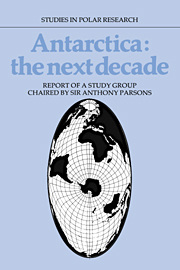Summary
In 1985 the David Davies Memorial Institute of International Studies decided to embark on a study of the future of Antarctica. I was invited to chair a Group to produce a book covering the principal aspects of this subject. What follows is the result of our work which has extended over several meetings and a period of about eighteen months.
There is no doubt about the timeliness of this exercise. Many factors are converging in such a way as to oblige governments and other interested bodies to focus their attention on developments in and regarding Antarctica. First, the Antarctic Treaty contains a provision which could open the way for proposals from within the membership for modification or amendment of the Treaty after the expiration of 30 years from its entry into force. This date, 1991, is getting close. Second, an outside challenge to the continuation of the Treaty in its present form has been gathering momentum at the United Nations since 1982. A group of non-aligned States, led by Malaysia, have been canvassing the argument that the present arrangements are too exclusive, particularly in the light of the possibility, however remote, of commercial exploitation of Antarctic mineral and other resources. They are advocating that a more universal system should be negotiated in replacement or extension of the Antarctic Treaty: this would apply to the continent the notion of the ‘common heritage of mankind’ as enshrined in the Convention on the Law of the Sea, thus bringing Antarctica into line with the concepts of the New International Economic Order.
- Type
- Chapter
- Information
- Antarctica: The Next DecadeReport of a Group Study Chaired by Sir Anthony Parsons, pp. ix - xPublisher: Cambridge University PressPrint publication year: 1987

